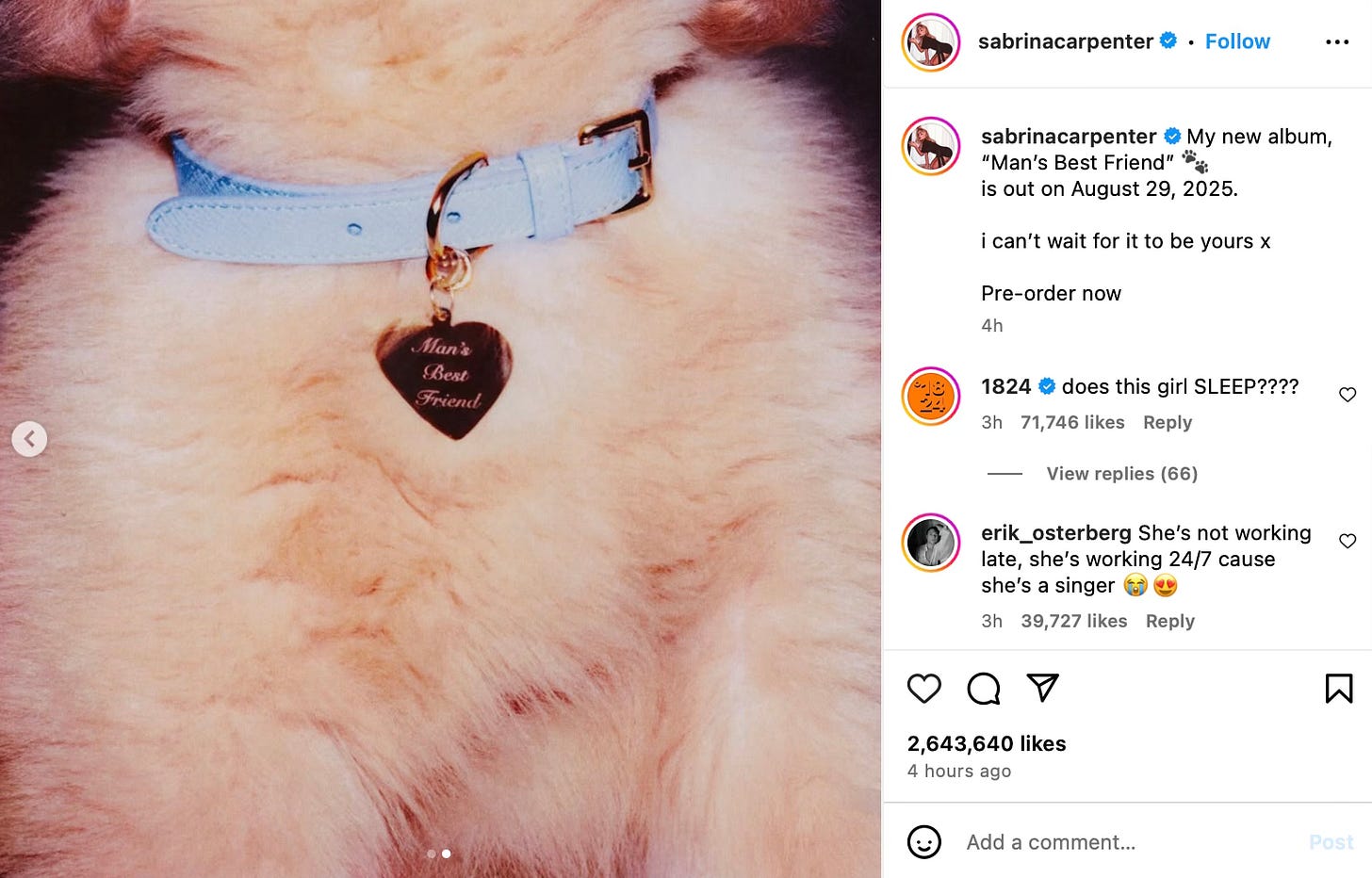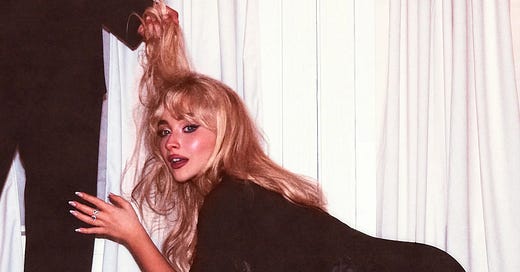Sabrina Carpenter is a heterofatalist princess
The pop star campily romanticizes women being mistreated by men—and then crawling back to them. She perfectly understands the current mood.
The first episode of , my new podcast with , dropped this week. If you’re into my Sabrina take, you’re gonna love our pod—and our Substack community, where our subscriber chat is currently unpacking the “Manchild” lyrics as a rich hetero-cultural text.
Yesterday, Sabrina Carpenter announced her next album, titled Man’s Best Friend. Alongside that “hmm, interesting” title, she released some kinda-sorta kinky imagery.
In one photo, she kneels down in a black mini-dress in front of a man in a suit who grips her hair in his hand. The next image: a closeup of a fluffy—and one might say blond—dog with a collar tag reading, “Man’s Best Friend.” On Instagram, her caption included an emoji of a pair of tiny paw prints. “i can’t wait for it to be yours x,” she said of her album, though there are other readings.
In all of this, of course, there is submission, as well as the most vanilla invocation of pup play imaginable.

Carpenter has made scandalized headlines for a while now thanks to her winkingly suggestive lyrics and playful miming of various sex acts during her concerts. She’s even been accused of “pedobaiting” (the Polyesterzine Podcast has a good critical take on her critics).
I’ve resisted wading into the discourse, but I like Carpenter, she makes me smile, and I’m partial to
’s declaration that she is “one of the straight girls who gets Honorary Femme status; her whole vibe is CAMP.”As a pop star whose job demands raising eyebrows, where do you go from outraged headlines about corrupting the youth? Well, this next album signals a slightly edgier turn. More interesting to me, though, is the way that Man’s Best Friend seems to alight on a current mood around heterosexuality. (It’s not for nothing that I just launched a podcast called Dire Straights.)
A few days ago, Carpenter released the first single off the album. It’s called “Manchild.” A sampling of the lyrics:
You said your phone was broken, just forgot to charge it
Whole outfit you're wearing, God, I hope it's ironic
Did you just say you're finished? Didn't know we started
It's all just so familiar, baby, what do you call it?Man-child
Why you always come a-running to me?
Fuck my life
Won't you let an innocent woman be?
Never heard of self-care
Half your brain just ain't there
Man-child
Why you always come a-running, taking all my loving from me?Why so sexy if so dumb?
And how survive the Earth so long?
If I'm not there, it won't get done
I choose to blame your mom
Does Sabrina Carpenter read this newsletter, because I just wrote about “man babies” and women mothering men. On Instagram, Carpenter described the song as the “embodiment of a loving eye roll.” The “loving” bit is essential here. She added a tongue-in-cheek “thank you” to “men for testing me,” followed by a pig and heart emoji.
In the annals of pop culture, that particular emoji combination could come to stand in for a whole lot about this moment in hetero history.
Carpenter’s lyrics tear men to shreds—they’re dumb, incompetent, and unreliable. But she loves them anyway. In fact, she teasingly sings, “I like my boys playing hard to get and I like my men all incompetent.” In a post about the song’s accompanying music video, she wrote, “no animals were harmed in the making but some men were.”
She deploys ironic misandry alongside a very familiar heterofatalism (which is, in short, a performative sense of being stuck in a disappointing experience of heterosexuality). As Carpenter puts in, “Fuck my life” (read: fuck my heterosexuality). This isn’t rebellion but rather resignation. Men are the worst but she loves them. What are you gonna do?
The song’s answer seems to be: cheekily romanticize the oppressor and his oppression. For all its hate, Manchild is actually a love song. And like any good country-style pop song, it is very bittersweet.

In a matter of days, Carpenter moved from this “loving eyeroll” of a song to images of her kneeling at a man’s feet, her hair being held almost like a leash. This feels totally consistent, actually. Again. What are you gonna do?
One answer is to not only cheekily romanticize but also eroticize oppression. You could call it “sexy heterofatalism,” an adaptive strategy for loving men in patriarchy. I’m not arguing this in a “false consciousness” way. I’m arguing this in a “wow, do I get it” way. As I wrote in my coming-of-age memoir:
I had for years felt guilty about fantasies of eroticized power imbalances. These days, though, I marveled at the human mind’s ingenuity, creativity, and resilience. I accepted what it sometimes takes to feel safe enough to want sex in the world in which we live. As the sex-positive feminist Lisa Palac had written of her submissive desires, “When you’ve got a lemon, make lemonade.” I not only felt great about making lemonade, but also recognized the difference between genuinely wrestling for power in the bedroom and playfully pretending at the same with candor, communication, and reciprocal understanding.
Of course, Carpenter isn’t selling “candor, communication, and reciprocal understanding.” Nor is there any evidence (yet!) that she is genuinely exploring or expressing kinky desires. But I do think she is using BDSM-adjacent imagery to tap into straight women’s experiences with the trap of heteronormativity.
Kink often involves fantasies of debasement; loving straight men in patriarchy often involves actual debasement. The key difference being the presence of consent and negotiation. Heteronormativity doesn’t negotiate; it demands and extracts.
Carpenter is turning straight women’s impossibly fraught feelings into playful theater. Of course, there is capitalism and commercialism at play here; some will unironically celebrate Carpenter as a woman on her knees. But, given her talent for camp, there’s also potential for satire, subversion, and, not to be underestimated, fun.





YES YES YES! I love this, and now I'll be quoting you right back in what I'm working on now. :)